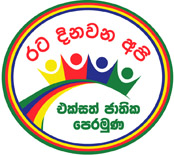
Ranil Wickremesinghe is a Sri Lankan politician serving as the ninth and current President of Sri Lanka. He also holds several ministerial roles, including Minister of Finance, Minister of Defence, Minister of Technology and Minister of Women, Child Affairs and Social Empowerment. Wickremesinghe has led the United National Party (UNP) since 1994 and has been Prime Minister of Sri Lanka on six occasions.

The United National Party is a centre-right political party in Sri Lanka. The UNP has served as the country's ruling party, or as part of its governing coalition, for 38 of the country's 74 years of independence, including the periods 1947–1956, 1965–1970, 1977–1994, 2001–2004 and 2015–2019. The party also controlled the executive presidency from its formation in 1978 until 1994.

Parliamentary elections were held in Sri Lanka on 2 April 2004. The ruling United National Party of Prime Minister Ranil Wickremesinghe was defeated, winning only eighty two seats in the 225-member Sri Lankan parliament. The opposition United People's Freedom Alliance won 105 seats. While this was eight seats short of an absolute majority, the Alliance was able to form a government.
The United People's Freedom Alliance was a political alliance in Sri Lanka founded by former Sri Lankan president Chandrika Kumaratunga in 2004 and dissolved by former Sri Lankan President Maithripala Sirisena in 2019.
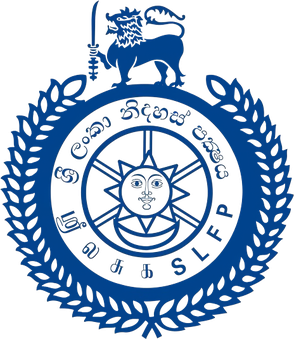
The Sri Lanka Freedom Party is one of the main political parties of Sri Lanka. It was founded by S. W. R. D. Bandaranaike in 1951 and has been one of the two largest parties in the Sri Lankan political arena since. It first came to power in 1956 and has served as the predominant ruling party on a number of occasions. It is currently the third largest party in the Parliament of Sri Lanka after the Sri Lanka Podujana Peramuna and the Samagi Jana Balawegaya.

Nambukara Helambage Rajitha Harischandra Senaratne is a Sri Lankan dentist, politician, member of parliament and former cabinet minister. He is currently a member of parliament representing Kalutara district

Abdul Rauff Hibbathul Hakeem is a Sri Lankan politician and current member of parliament, representing the Kandy electorate since 2010. Hakeem is the leader of the Sri Lanka Muslim Congress (SLMC), and a member of the United National Front for Good Governance.
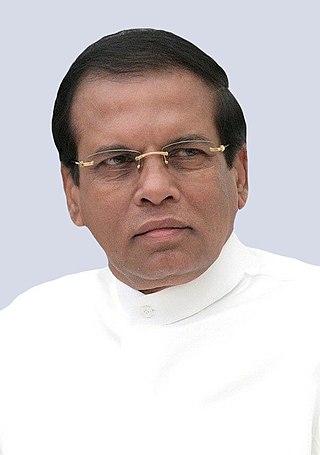
Maithripala Yapa Sirisena is a Sri Lankan politician who served as the seventh President of Sri Lanka from 9 January 2015 to 18 November 2019. Sirisena is Sri Lanka's first president from the North Central Province of the country and does not belong to the traditional Sri Lankan political elite. He is currently a member of parliament from Polonnaruwa.
Kandy (Mahanuwara) electoral district is one of the 22 multi-member electoral districts of Sri Lanka created by the 1978 Constitution of Sri Lanka. The district is conterminous with the administrative district of Kandy in the Central province. The district currently elects 12 of the 225 members of the Sri Lankan Parliament and had 970,456 registered electors in 2010.
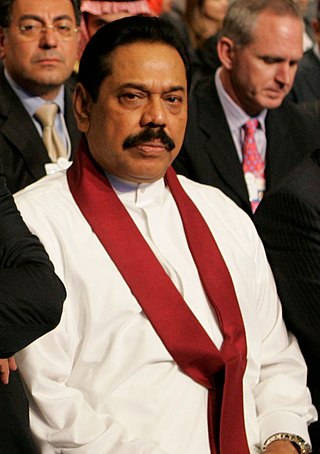
Parliamentary elections were held in Sri Lanka on 8 and 20 April 2010, to elect 225 members to Sri Lanka's 14th Parliament. 14,088,500 Sri Lankans were eligible to vote in the election at 11,102 polling stations. It was the first general election to be held in Sri Lanka following the conclusion of the civil war which lasted 26 years.
The 14th Parliament of Sri Lanka was a meeting of the Parliament of Sri Lanka, with the membership determined by the results of the 2010 parliamentary election held on 8 and 20 April 2010. The parliament met for the first time on 22 April 2010 and was dissolved on 26 June 2015.
The 13th Parliament of Sri Lanka was a meeting of the Parliament of Sri Lanka, with the membership determined by the results of the 2004 parliamentary election held on 2 April 2004. The parliament met for the first time on 22 April 2004 and was dissolved on 9 February 2010.
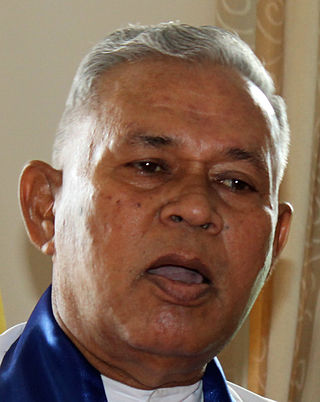
Munasinghe Kariyawasam Appuhamilage Don Somadasa Gunawardana was a Sri Lankan politician and a former member of Parliament and government minister.

Parliamentary elections were held in Sri Lanka on 17 August 2015, ten months ahead of schedule, to elect 225 members to Sri Lanka's 15th Parliament.

The National Congress is a registered political party in Sri Lanka. It was founded in 2004 by A. L. M. Athaullah.
The 15th Parliament of Sri Lanka was the meeting of the Parliament of Sri Lanka with its membership determined by the results of the 2015 parliamentary election, held on 17 August 2015. The parliament met for the first time on 1 September 2015 and was dissolved on 3 March 2020.
The Joint Opposition was a political alliance formed by a faction of the Sri Lanka Freedom Party (SLFP) alongside several of the major quasi-left-wing parties of Sri Lanka. It was once the largest opposition group in the Sri Lankan Parliament. It was formed after the two major parties, the SLFP and the United National Party (UNP) forming a unity government, leading to a great degree of discontent amongst many SLFP members, who then went on to form the Joint Opposition alongside other parties from the United People's Freedom Alliance (UPFA). It aims to give voice to the mandate voters provided to the UPFA at the 2015 general election in which many loyal SLFP members felt abandoned when the party joined the UNP-led government.

Parliamentary elections were held in Sri Lanka on 5 August 2020 to elect 225 members to Sri Lanka's 16th Parliament. 16,263,885 people were eligible to vote in the election, 31.95% of whom were young voters.

Presidential elections were held in Sri Lanka on 16 November 2019. Incumbent president Maithripala Sirisena did not run for a second term. Gotabaya Rajapaksa, brother of former president Mahinda Rajapaksa, was the candidate of the Sri Lanka Podujana Peramuna and was endorsed by the Sri Lanka Freedom Party. Sajith Premadasa, son of former president Ranasinghe Premadasa and deputy leader of the United National Party was the candidate of the ruling party.

The Samagi Jana Balawegaya is a political alliance led by Leader of the Opposition Sajith Premadasa. It is the largest opposition party in the Parliament of Sri Lanka since 2020.
